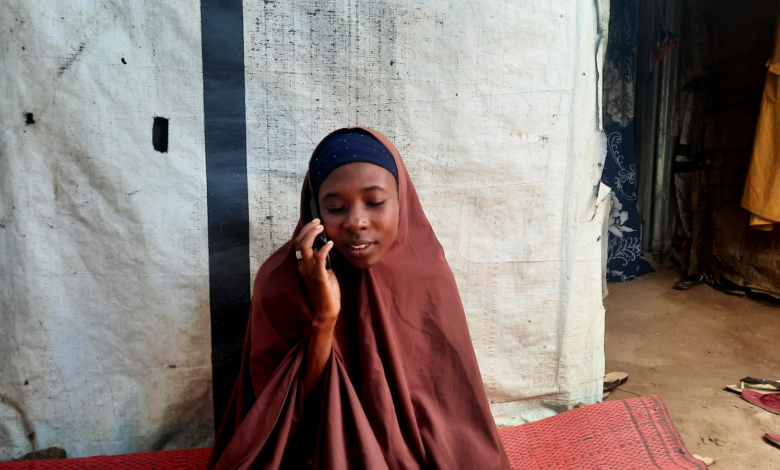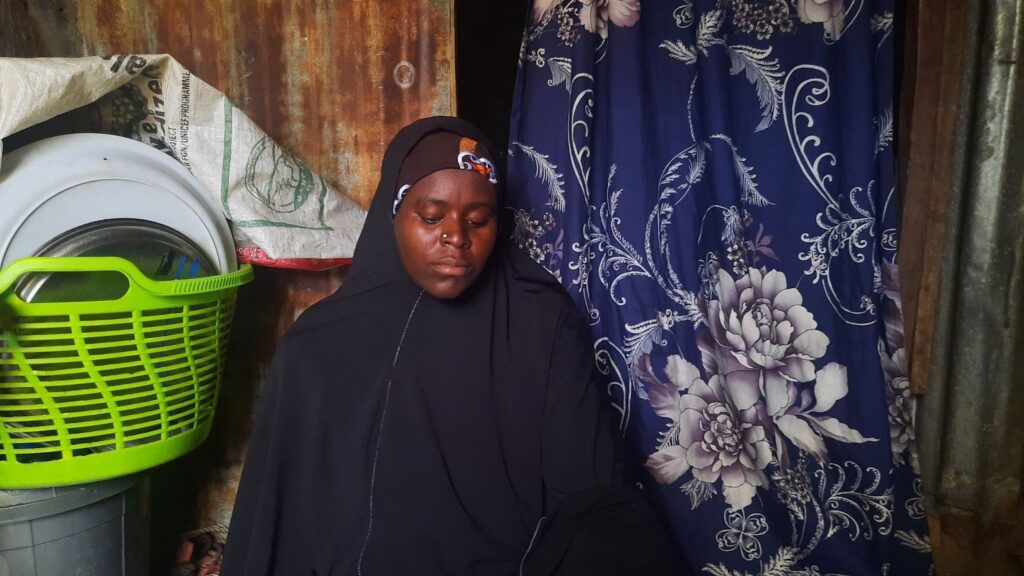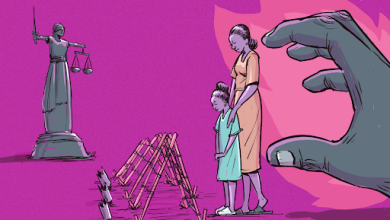‘Hello, My Love’: Giwa Barracks Detainees Finally Allowed To Make Phone Calls
Knifar, an advocacy group formed by the detainees’ wives, estimated that over 200 women had received phone calls from the military detention facility as of the first week of September. But the women insist that they would rather their husbands be released.

“Hello,” a voice called out from the other side.
The phone number was strange. The voice was familiar. But it was a voice Ya Bawaye had not heard in over eight years. Her mother had just handed her her blue Tecno phone. Holding it against her right ear, she began to wonder. Could it be? Before she had time to gather her thoughts, she received confirmation.
“It’s Babagana,” the voice said. “Or don’t you recognise me?”
Ya Bawaye replied that she was surprised. It was all quite out of the blue.
“Have you been released?” she asked her husband.
No, he answered. Not yet.
Babagana was calling from Giwa barracks, a military detention facility in Maiduguri, Northeast Nigeria, notorious for holding Boko Haram suspects and others who were arbitrarily arrested for prolonged periods without trial. Though the barracks is less than a 30-minute drive from where Ya Bawaye lives with her mother and siblings, she has not seen her husband in nearly a decade.
Since the Boko Haram crisis erupted in 2009, the Nigerian military has detained thousands of people – mostly men – at Giwa barracks under suspicions of being members of the terror group or working with them. But many of the people held at the facility, according to Amnesty International, were arrested “largely based on random profiling … rather than on reasonable suspicion of having committed a criminal offence”.
People taken to this facility had no access to lawyers. Families who attempted to see them were sent back or arrested as well. The most typical way people confirmed the status of their loved ones was through the accounts of former detainees who shared cells with them.
But that is starting to change.
In mid-August, the families of the detainees at Giwa barracks started receiving phone calls. The calls have been frequent — almost daily. The leadership of Knifar, an advocacy group formed in 2017 by the wives of detainees, said it first heard about the prospect of calls and visits over the radio. They estimated that over 200 women had received phone calls from their detained husbands as of the first week of September. These include women from Ajiri, Bama, Mafa, Konduga, Pulka, and other parts of Borno.
A list was drawn of detainees who had the phone numbers of their relatives, and then they took turns using a phone.
The calls started pouring in shortly after HumAngle wrote to the Nigerian Army and the Ministry of Defence to share the findings of our investigation into the missing persons’ crisis in the region — done in collaboration with New Lines Magazine. In the letter delivered on Aug. 4, we asked, among other things, if the authorities had any plans of disclosing the identities of everyone being detained in connection with the Boko Haram insurgency.
We reached out to army spokesperson Brigadier General Onyema Nwachukwu for this story to confirm the developments and claims that Giwa barracks would soon be open to visitation but did not get a response.

When Babagana Akau, 30, called at half past 2 p.m. on Aug. 14, he told his wife their conditions in prison had improved, but he still had no idea when he would be released.
“Keep praying. Please tell my mother to pray for me, and continue to be patient,” he urged.
He added that the authorities told them they would soon start allowing visitors into the barracks. When Ya Bawaye asked how he was doing, he replied that he would tell her all about it during her visit.
Yakura Kumshe, secretary of the Knifar Group, said some women already went to the barracks after receiving calls, but they were turned away with the assurance that visits may be scheduled later.
Ya Bawaye and her husband spoke for over 14 minutes. Within that time, Babagana also talked to her mother and brothers. But despite the duration, Ya Bawaye says, she did not hear anyone try to hurry him up so the phone could be passed on to someone else.
As they rounded up their conversation, Babagana promised to call again as soon as he got a chance.
The same day, Ya Bawaye received another call from the same number. But it wasn’t Babagana. It was another man who was also eager to talk to his wife, Ya Gana, but did not have her number. Ya Gana was in the same group of internally displaced people as Ya Bawaye when they arrived in Bama town years ago. After giving her number to her husband, she narrated the incident to the woman. Later, Ya Gana would tell her she made sure her phone never left her side afterwards, even while she charged it.
The buzz of excitement among the women does not sit well with Fatima Bukar, leader of the Knifar Group. It reminds her of her predecessor, Kellu Haruna’s death.
Haruna Modu, Kellu’s husband, was locked up at the Borno Maximum Security Prison, and she had not seen him since his arrest four years before that. In October 2019, she finally managed to obtain a video of him. Haruna introduced himself, greeted her, asked after the children, and requested that they should continue to pray for his release. The video was short, but it meant everything to Kellu, who could not bring herself to stop watching.
“That night, she didn’t sleep,” Fatima recalled, wearing a worried look. “I was watching her. In the morning after the fajr salat, she started watching the video again.”
Kellu suffered a stroke and passed away a few days later. Some other women who had received similar proof of life videos of their husbands also became ill, developing heart conditions.
“The calls are good. It is better than the silence,” Fatima conceded, “but they increase anxiety among us.”
Ya Bawaye has received other calls, too, from other detainees trying to get in touch with their loved ones. The last one came in late August, about a week before her chat with HumAngle.
“But I don’t know some of the women,” she said.

Ya Bawaye and her husband are from Soye, a village in the Bama area of Borno. One time, when Boko Haram insurgents and the military engaged each other in a gun battle, the people fled from the village and sought refuge in a neighbouring Shuwa community.
Shortly after Muhammadu Buhari was sworn in as Nigeria’s President in May 2015, the authorities called on people staying in the rural areas to surrender to the military. So, the young couple returned to Soye to get their properties and then proceeded to Bama town the next morning. When they got to a military checkpoint, the soldiers separated the men from the women.
“They started beating the men in our presence,” she recalled.
Then they transferred everyone to a prison in Bama, where they spent the following 13 days.
“On the evening of the 12th day, they told the men they would be transferred to Maiduguri, but they didn’t say where. That evening, my husband called me to come get my clothes because we packed our things together. Very early the next morning, one soldier came and called out their names. They cut pieces of cloth and asked them to pick one each. They then blindfolded them and took them to Maiduguri. That was how we separated.”
Ya Bawaye said she could never forget this day.
She had no idea where they had taken him at first. Seven months later, the women heard from another group of men who were taken to Giwa barracks and had the good fortune of getting released months later that they had seen their husbands at the facility.
The last she heard of Babagana before the call was in early 2022, when her father, Waziri Modu, was released from detention.
Many women are still waiting. They have not been called, possibly because their husbands have no idea how to reach them. Another reason is that while the women have the number used for the calls, they cannot speak to the person with custody of the phone. Yakura explains that this is because the official appears to only speak English and Yoruba, languages they are not familiar with.
Though her husband was released close to two years ago, she herself has many people who remain in detention, including her brothers, in-law, and kinsmen.
“Women who have not received calls are worried about not knowing the condition of their people,” Fatima told HumAngle. “They are coming to me that what of our own, are they alive? I keep assuring them that they will hear from them.”
The Knifar leaders point out that detainees at facilities outside Maiduguri are not getting the same chance to call their families. They urge the government to simply release everyone who is innocent.
“Those who attacked us on motorcycles, killed our people, and burnt our houses that have surrendered have been brought back to our midst while our husbands who are innocent have still not been released for years. There is no justice in this,” Fatima said.

Ya Bawaye confirmed the mixed feelings that came with the sudden call.
She could not stop thinking about Babagana since their conversation and said she felt bad about not being able to reunite with him. Still, the call gives her hope that the government intends to do the right thing.
She pleaded: “Since even those who carried guns have surrendered and were accepted back to society, they should release our husbands who are just suspects.”
Summary not available.
Support Our Journalism
There are millions of ordinary people affected by conflict in Africa whose stories are missing in the mainstream media. HumAngle is determined to tell those challenging and under-reported stories, hoping that the people impacted by these conflicts will find the safety and security they deserve.
To ensure that we continue to provide public service coverage, we have a small favour to ask you. We want you to be part of our journalistic endeavour by contributing a token to us.
Your donation will further promote a robust, free, and independent media.
Donate HereStay Closer To The Stories That Matter




